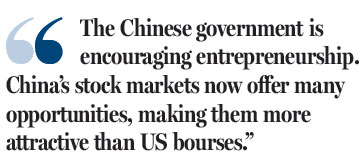Heading home to conquer the world
Updated: 2016-04-27 08:05
By Meng Jing and Cai Xiao in Beijing(China Daily USA)
|
||||||||
Overseas-listed Chinese companies seek to go private, eye mainland bourses for a brighter future
Many of the Chinese companies that listed overseas, especially in the United States, are pondering delisting and eyeing China's bourses instead.
About 40 overseas-listed Chinese companies said they have initiated moves toward delisting since June 2015, according to data compiled by Tiger Brokers, an app that helps Chinese investors to trade on US bourses.
Not exactly returning prodigals, they feel home's where their future is. One such believer in China's prospects is Victor Koo, chief executive officer of the hitherto New York Stock Exchange-listed Heyi Group, known for its online video site Youku Tudou Inc, dubbed China's YouTube.oe.
Heyi, which listed on the NYSE under the ticker Yoku in December 2010, bought back its shares and went private earlier this month, a process that took six months to complete and entailed $4.5 billion in costs, byway of the buyback offer, excluding incidental costs like the processing fee.

Heyi plans to list in the Chinese mainland by 2019. Koo is confident the delist-and-list exercise would help Heyi evolve into a globe-influencing culture-and-entertainment giant based in China.
Many other CEOs of Koo's ilk are pondering buybacks to follow in Heyi's footsteps.
More than half of the China-bound Chinese companies are internet-related businesses such as Momo Inc, a social networking app, and iDreamSky Technology Ltd, a mobile game developer and publisher.
Until a few years back, market conditions, regulatory stipulations and stringent norms made it difficult for domestic companies to list on the mainland bourses. For example, companies needed to be profitable first before they could apply for an initial public offering.
Also, offshore-registered but Chinese-founded companies such as internet search giant Baidu Inc and the US-listed Chinese e-commerce giant Alibaba Group Holding Ltd, in which overseas variable interest entities or VIEs were substantial shareholders, were not allowed to list on the A-share market.

It was a period when China's internet-related industry was yet to see explosive growth. But it was a boom time for US internet firms. Unlike investors in China, their overseas counterparts understood the value and potential in technology firms.
So, forward-looking but cash-strapped Chinese startups tapped the friendlier US bourses. Foreign markets were more attractive because dollar-denominated venture capital funds and private equity players were willing to back promising Chinese technology startups without much fuss.
After a few years, China, with its newfound emphasis on entrepreneurship and innovation, realized it needs those companies back. The government began easing regulations to lure them back. For instance, the profitability stipulation may no longer apply to internet-related companies.
At the same time, other conditions (like valuations) improved in China and future prospects brightened on the back of rapid growth, prompting a rethink among the overseas-listed Chinese companies such as Qihoo 360 Technology Co, owner of China's second-biggest internet search engine.
The NYSE-listed Qihoo tops the list of buyback proposals so far with its $9.3 billion offer.
Backdoor listing, which involves buying out, or taking a majority stake in, a listed shell company in China is popular among such returning companies.
Yang Feng, founding partner and chief executive officer of Shenzhen-based Blue Ocean Capital Group, swears by this method. "Backdoor listing is still the best way for a company to list on the A-share market, especially for those whose market value is more than 10 billion yuan ($1.54 billion). It is much quicker. The cost of a shell company and dilution of its own equity could prove acceptable for a big company with a market value of 10 billion yuan. There is more than one way to go public in China now."
Companies with a smaller market value could opt for initial public offerings. Only, they would need to queue up for the approval of the China Securities Regulatory Commission. But then, they could utilize the silent period to develop their business, he said.
Also, the Hong Kong stock market and the mainland's New Third Board - the National Equities Exchange and Quotations - are also good destinations for these companies to go public again, depending on their business size and goals.
David Tang, partner and managing director of Nokia Growth Partners, a fund that invested in classifieds website Ganji.com, said potential lofty valuations in China are luring overseas-listed Chinese companies back home.
"The Chinese government is encouraging entrepreneurship. China's stock markets now offer many opportunities, making them more attractive than US bourses, especially in terms of valuations," said Tang.
For instance, 21Vianet Group, a leading carrier-neutral internet data center services provider, announced in June 2015 that it would delist from the Nasdaq market. That process is on. Its market valuation now is $1.82 billion, much lower than the $10 billion valuation of its competitor, DrPeng Group, an A-share company.
But Heyi's Koo said there is more to the story. "Returning home is not only about getting a higher valuation from the Chinese market but about gaining a strong momentum in business."
Agreed Tang. "Chinese investors are more familiar with Chinese companies than (foreign investors), which, in turn, can make fundraising in China smooth."
Yang of Blue Ocean Capital said the advantages of delisting abroad and listing in China far outweigh the disadvantages. "Delisting overseas can unlock a company's full corporate value in the A-share market. Brand awareness will also increase and drive sales."
But Wang Qiang, co-founder of the Beijing-based seed fund ZhenFund, said there is a massive cost to delisting from a US bourse and going private, not only financially but in terms of time. Big companies such as Baidu and Alibaba may find it difficult to buy back huge chunks of stakes from foreign investors.
"For example, Alibaba, which listed on the NYSE in September 2014 through the largest-ever IPO, enjoys a market cap of around $185 billion. It would require a huge amount of money to buy back the shares held by other investors," Wang said.
So, such groups may spin off some of their business units, take them private and then list them in China.
But companies that have already gained fame among overseas investors are also unlikely to go private. "Take New Oriental Education & Technology Group, the largest provider of private educational services in China. It has got itself recognized in the US with an impressive $5 billion valuation. It is unlikely that New Oriental will return to China," Wang said.
Vinsan Wang, a guest analyst with the Beijing-based Tiger Brokers, said overseas-listed Chinese companies seeking to go private would still face challenges like time and cost-overruns, and risks like regulatory changes.
Heyi's Koo said he thinks it is, nevertheless, "important to visit China's capital market when your core business is related to culture and entertainment. Your users are mostly based in the country".
He said in the coming 10 years, Chinese firms such as Heyi - that is, those registered and listed in China - will likely overtake current online video giants such as Netflix Inc and YouTube, and emerge as global majors in their own right.
Ma Si contributed to this story.
Contact the writers at mengjing@chinadaily.com.cn and caixiao@chinadaily.com.cn
|
Yang Weidong, vice-president of Heyi Group, at a forum in Shanghai. Listed above are some of the firms seeking to delist from the US bourses and list on the A-share market. Provided To Chian Daily |
(China Daily USA 04/27/2016 page15)
- EU pledges 20 mln euros to nuclear safety fund
- DPRK seems set to launch Musudan ballistic missile
- Austria far right freezes out coalition in presidency race
- Chernobyl's 30th anniversary: Living under radiation
- S. Korea denounces DPRK's missile test
- Saudi-led coalition says kills more than 800 al-Qaida militants in Yemen

 Human-like robots say 'hi' to President Xi
Human-like robots say 'hi' to President Xi
 Animals turn savvy earners from entertainers
Animals turn savvy earners from entertainers
 Slackline walker conquers Tiger Jumping Gorge
Slackline walker conquers Tiger Jumping Gorge
 Top 6 domestic new-energy vehicles at Beijing auto show
Top 6 domestic new-energy vehicles at Beijing auto show
 30th anniversary of the Chernobyl nuclear disaster marked
30th anniversary of the Chernobyl nuclear disaster marked
 Shanghai unveils Disney-themed plane and station
Shanghai unveils Disney-themed plane and station
 Hebei's poverty-stricken village gets new look after Xi's visit
Hebei's poverty-stricken village gets new look after Xi's visit
 Cooks get creative with spring food exhibition in central China
Cooks get creative with spring food exhibition in central China
Most Viewed
Editor's Picks

|

|

|

|

|

|
Today's Top News
Liang avoids jail in shooting death
China's finance minister addresses ratings downgrade
Duke alumni visit Chinese Embassy
Marriott unlikely to top Anbang offer for Starwood: Observers
Chinese biopharma debuts on Nasdaq
What ends Jeb Bush's White House hopes
Investigation for Nicolas's campaign
Will US-ASEAN meeting be good for region?
US Weekly

|

|
